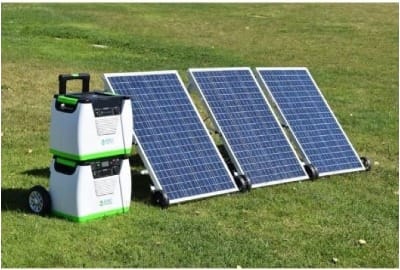These devices, which convert sunlight into electricity, offer a clean, renewable, and efficient way to power homes, businesses, and outdoor adventures. As the world shifts towards greener energy solutions, solar generators are not just a trend but a significant step forward in the journey toward a more sustainable future.
What is a Solar Generator?
A solar generator is a compact device that captures sunlight through solar panels, converts it into electrical energy, and stores it in a battery for later use. Unlike traditional gasoline or diesel-powered generators, solar generators produce no emissions, making them an environmentally friendly option. They are designed to provide a reliable source of power during emergencies, outdoor activities, and even in everyday use for those looking to reduce their carbon footprint.

How Do Solar Generators Work?
The operation of a solar generator is straightforward. It involves three main components:
- Solar Panels: These panels capture sunlight and convert it into direct current (DC) electricity.
- Charge Controller: This device regulates the amount of electricity flowing into the battery from the solar panels, ensuring that the battery is not overcharged or damaged.
- Battery Storage: The electricity generated is stored in a high-capacity battery, typically a lithium-ion battery, for later use.
- Inverter: When you need to use the stored energy, the inverter converts the DC electricity into alternating current (AC), which is compatible with most household appliances and devices.
This seamless process allows you to power everything from small electronics like smartphones and laptops to larger appliances such as refrigerators and TVs, depending on the capacity of the generator.
Benefits of Solar Generators
1. Environmental Impact:
The most significant advantage of solar generators is their positive impact on the environment. Unlike fossil fuel-powered generators, solar generators do not emit greenhouse gases or other pollutants. By using the sun's energy, they help reduce reliance on non-renewable energy sources, contributing to a cleaner and more sustainable planet.
2. Cost Savings:
While the initial investment in a solar generator might be higher compared to traditional generators, the long-term savings are substantial. Solar energy is free, and once the system is installed, there are no ongoing fuel costs. Over time, this can lead to significant savings, especially in regions with high electricity costs.
3. Energy Independence:
Solar generators provide a sense of energy independence, especially in areas prone to power outages or in remote locations where access to the grid is limited. With a solar generator, you can have a reliable power source wherever you are, whether it's during a camping trip or in the event of a natural disaster.
4. Quiet Operation:
Unlike noisy gas-powered generators, solar generators operate silently. This makes them ideal for use in residential areas, during outdoor activities, or in any situation where noise pollution is a concern.
5. Low Maintenance:
Solar generators have fewer moving parts compared to traditional generators, which means there is less that can go wrong. This translates to lower maintenance requirements and a longer lifespan for the system.
Choosing the Right Solar Generator
When selecting a solar generator, several factors should be considered:
- Power Capacity: Determine how much power you need. This will depend on what you plan to use the generator for. Small generators are sufficient for charging devices, while larger ones can power household appliances.
- Portability: If you need a generator for camping or other outdoor activities, portability is key. Look for lightweight models with handles or wheels for easy transport.
- Battery Type: Lithium-ion batteries are the most common due to their efficiency and long life. However, some models may use lead-acid batteries, which are cheaper but bulkier and have a shorter lifespan.
- Solar Panel Compatibility: Ensure that the generator is compatible with solar panels, and consider whether the panels are included in the purchase or if they need to be bought separately.
Conclusion
Solar generators are an excellent investment for anyone looking to harness the power of the sun to meet their energy needs. They offer a clean, quiet, and cost-effective alternative to traditional generators, making them suitable for a wide range of applications. As technology continues to advance and prices decrease, solar generators will likely become even more popular, playing a crucial role in the global shift towards renewable energy.
